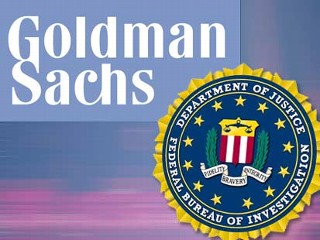
Goldman Sachs struck a secret deal with Greece to help it mask its vast debts, it emerged yesterday.
The Wall Street giant is claimed to have reaped as much as £192million in fees by entering a complex currency transaction in 2001 that helped Athens borrow cash without putting it on the books as a loan.
The so-called 'swap' deal, while permitted under EU rules, helped Greece meet eurozone limits on government borrowing.
Fiscal talks: Eurozone finance ministers meet in Brussels yesterday as the Eurogroup. They are expected to back an exceptional measure to instill budgetary discipline in Greece
Greece's vast deficits caused it to fail the criteria for joining the single European currency in 1999, but it succeeded in 2001.
Member nations had to reduce their budget deficit to less than 3 per cent of gross domestic product and trim national debt to less than 60 per cent of GDP.
The Greek deficit stands at nearly 13 per cent of GDP and public debt is almost twice the official ceiling at 113 per cent of GDP.
Under the deal between Goldman and Greece, the country's government effectively obtained a £640million loan without adding to its public debt burden.
This was achieved because the arrangement was treated as a 'currency trade'.
The allegations prompted uproar in Europe, where ministers are meeting to discuss a possible Greek bailout.
EU authorities demanded that Athens come clean over its financial engineering.
New storm: Goldman Sachs helped mask Greece's debts
But the Goldman arrangement is thought to be just one of many that helped mask the full scale of Greece's fiscal chaos.
Other Mediterranean countries, including Italy, have resorted to similar tactics.
The disclosures triggered questions in Parliament yesterday over whether the UK Government has entered any 'swap' arrangements curbing its debt burden.
Goldman Sachs declined to comment last night.
The bank has come under steady fire over its role in the sub-prime crisis and the vast bonuses being doled out to employees. Last month it set aside £10billion for its staff's performance in 2009.
The revelations come at a hugely damaging time, given fears that Greece is in danger of defaulting on its debts.
Yesterday the euro fell another 0.3 per cent to 1.36 against the dollar.
Finance minister Georges Papaconstantinou admitted his country was in 'a terrible mess' as he arrived in Brussels for the talks with fellow ministers.
He sent tremors through the markets by comparing the task of fixing Greece's deficits to 'changing the course of the Titanic'.
The suggestion that his country turned to investment such as Goldman to shroud the full extent of its debts will trigger particular fury in Germany, where taxpayers face the unappetising prospect of leading a Greek state rescue.
Conservative MP Michael Fallon said: 'How much confidence can we have in any progress reported from Greece when they (the EU authorities) have already failed to pick up fiddles like this?'
MPs will question Goldman Sachs director Gerald Corrigan on the deal when he appears before the Treasury Committee on Monday, Mr Fallon said.
Yesterday he tabled a Parliamentary question asking the Chancellor whether Britain was party to similar dealings with investment banks.
A Treasury spokesman said: 'The UK does not use swaps of any type for debt management purposes and has not done so under the current arrangements for debt management.'
However, Britain is known to have moved billions of pounds of liabilities off the government books through mechanisms such as the public finance initiative.

No comments:
Post a Comment